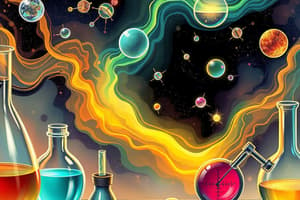Podcast
Questions and Answers
What branch of chemistry is foundational to other areas of chemistry?
What branch of chemistry is foundational to other areas of chemistry?
- Inorganic chemistry
- Organic chemistry
- Analytical chemistry
- Physical chemistry (correct)
Which of the following observations suggests that a chemical change has occurred?
Which of the following observations suggests that a chemical change has occurred?
- Change in state of matter
- Change in color
- Dissolution in water
- Formation of a gas (correct)
What characteristic of an atom determines its identity as a particular element?
What characteristic of an atom determines its identity as a particular element?
- Atomic mass unit
- Number of neutrons
- Number of electrons
- Number of protons in the nucleus (correct)
What is the mass number difference between isotopes of the same element?
What is the mass number difference between isotopes of the same element?
Which type of ion is formed when an atom has fewer electrons than protons?
Which type of ion is formed when an atom has fewer electrons than protons?
Flashcards
What is Chemistry?
What is Chemistry?
The branch of science that focuses on the composition, structure, and properties of matter.
What are isotopes?
What are isotopes?
Atoms of the same element that have the same number of protons but differ in the number of neutrons.
What is a Cation?
What is a Cation?
A positively charged ion formed when an atom loses electrons.
What is Biochemistry?
What is Biochemistry?
Signup and view all the flashcards
What is Accuracy?
What is Accuracy?
Signup and view all the flashcards
Study Notes
Chemistry Study Notes
- Chemistry: The branch of science studying matter's composition, structure, and properties.
- Physical Chemistry: A foundational branch of chemistry, underlying other areas.
- Biochemistry: The chemistry of living organisms.
- Scientific Method Steps: Observing, hypothesizing, and experimenting.
- Accuracy: How close a measurement is to the actual value.
- Precision: The consistency or reproducibility of a measurement.
- Kinetic Energy: The energy of motion.
- States of Matter: Solids, liquids, and gases. Gases have the highest kinetic energy.
- Most Abundant Element (Universe): Hydrogen.
- Most Abundant Element (Earth's Crust): Oxygen.
- Dalton's Theories: Law of definite composition and Law of multiple proportions.
- Evidence of Chemical Change: Formation of a gas, precipitate, or energy release.
- Isotopes: Atoms of the same element with different mass numbers.
- Atomic Identity Determinant: The number of protons in the nucleus.
- Atomic Mass Measurement Unit: Atomic mass unit.
- Ion: An electrically charged atom or molecule (different number of electrons than protons).
- Cation: A positively charged ion (fewer electrons).
- Anion: A negatively charged ion.
Table Completion
- Symbol, Z, A, N, Number of Electrons, Electrical Charge: Table entries are shown.
- He (Z=2, A=4, N=2): 2 electrons, 2+.
- Pb (Z=82, A=207, N=125): 82 electrons, 0.
- B (Z=5, A=10, N=5): 5 electrons, 0.
- Ag (Z=47, A=109, N=62): 46 electrons, 1+.
Studying That Suits You
Use AI to generate personalized quizzes and flashcards to suit your learning preferences.



